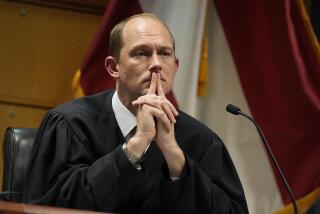Judge Says He’s Persuaded ‘Conspiracy Existed’ : Dismissal Denied in Winans Case
- Share via
NEW YORK — A federal judge, denying defense motions for dismissal of securities fraud, conspiracy and mail- and wire-fraud charges against a former Wall Street Journal reporter and two others, said Friday that he is “persuaded” that the alleged offenses took place and that a “conspiracy existed.”
Attorneys for R. Foster Winans, who wrote the Journal’s influential “Heard on the Street” stock-market column; his roommate, David Carpenter, and Kenneth P. Felis, a former stockbroker for Kidder, Peabody & Co., had spent several days presenting motions to dismiss the charges on the grounds that the government hadn’t proved any criminal violations.
The three men and former stockbroker Peter N. Brant, who has pleaded guilty and is a prosecution witness, were charged with conspiring to profit from advance knowledge of the columns.
But U.S. District Judge Charles E. Stewart Jr., who is hearing the the case without a jury, indicated that he disagreed.
“I am pretty well persuaded,” he said, “that the government has stated an offense and that the evidence introduced by the government has established beyond a reasonable doubt that a conspiracy existed and the actions alleged in the substantive counts of the indictments occurred.”
Observers of the case said the judge’s language, which came before the defense had presented its first witness, was unusually strong. They said that it was the first time that Stewart had made a ruling bearing on the substance of the government’s case.
Passed Advance Information
Lawyers have conceded that the case involves few questions of fact such as normally would be decided by a jury. There is little argument that Winans, beginning in October, 1983, arranged to pass advance information to Brant and Felis.
Thus, the question is whether what the defendants did was illegal, which they deny, and--since defense lawyers are arguing that the prosecution’s case rests on an extension of established law--whether they knew that it was illegal.
For example, in his motion for dismissal, Winans’ attorney, Don Buchwald, argued that, though Winans might have knowingly violated his newspaper’s policies on confidentiality, that does not automatically make what he did a crime. That, say these observers, becomes a question of law.
“This indicates, at least preliminarily, Judge Stewart’s view on the law,” said one lawyer who asked not to be identified. “It is not conclusive, but it is significant. In large measure, in this case, the facts are not disputed.”
Buchwald declined to say whether the judge’s remarks represented a setback for the defense. “We had hoped he would throw out the charges,” he said.
Assistant U.S. Atty. Peter Romatowski said “it’s better than a dismissal, but it’s not over yet.”
The prosecution, which had rested its case Thursday, presented 13 witnesses. Romatowski explained that, under federal law, the judge was required to draw all inferences most favorable to the government at this point in the trial.
Originally, Judge Stewart had reserved his decision on the defense motions. But, after a lunch break, he said he had made a mistake and that legal technicalities required that he rule on the motions before the defense presented its case. He then denied the motions, reminding defense attorneys that they could renew their challenges later.
The defense, which called two minor witnesses late Friday, plans to put Winans on the stand Monday.
More to Read
Inside the business of entertainment
The Wide Shot brings you news, analysis and insights on everything from streaming wars to production — and what it all means for the future.
You may occasionally receive promotional content from the Los Angeles Times.










